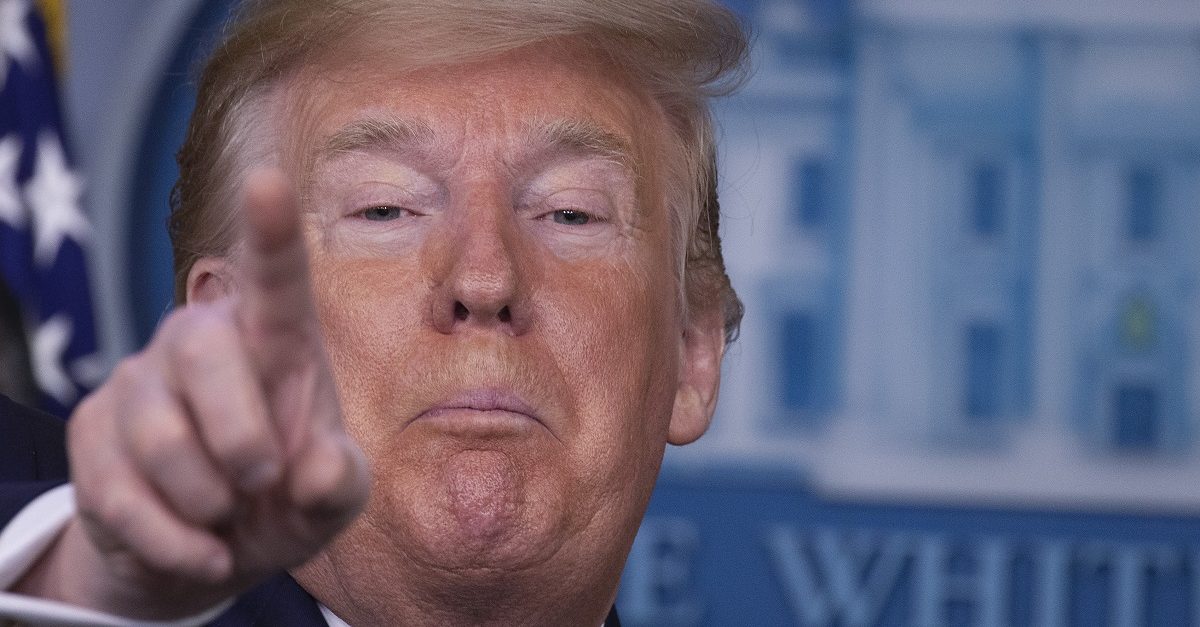
President Donald Trump on Wednesday falsely claimed that Michigan’s secretary of state sent absentee ballots to all of the state’s 7.7 million eligible voters, saying it was done “illegally” (also false), before threatening to withhold congressionally approved federal funds from the state (which would likely be illegal if carried out).
The president declaring that expanding absentee voting is a “path” to voter fraud – a conspiracy theory that has been widely debunked by election law experts. The president’s counterfactual claims and threats led to swift backlash from legal experts, with several likening his threat to withhold funding to the actions that led to his impeachment earlier this year.
“Breaking: Michigan sends absentee ballots to 7.7 million people ahead of Primaries and the General Election. This was done illegally and without authorization by a rogue Secretary of State. I will ask to hold up funding to Michigan if they want to go down this Voter Fraud path!” Trump tweeted.
Trump, who himself used an absentee ballot to vote in Florida’s primary earlier this year, then sent a follow up tweet tagging his chief of staff Mark Meadows, the acting director of the Office of Management and Budget (OMB), and the U.S. Treasury Department.
https://twitter.com/realDonaldTrump/status/1263074784499372032?s=20
University of Texas School of Law professor Stephen Vladeck summarized Trump’s tweet thusly:
Shortly after the Wednesday morning tweet from the president, Michigan Secretary of State Jocelyn Benson corrected the first problem with it.
“Hi! I also have a name, it’s Jocelyn Benson. And we sent applications, not ballots. Just like my GOP colleagues in Iowa, Georgia, Nebraska and West Virginia,” she responded.
And while Benson’s order will almost certainly be challenged by state Republicans, Michigan in 2018 passed a law allowing anyone in the state to vote by absentee ballot for any reason and there is no law prohibiting the secretary of state from sending unsolicited absentee voting ballots. In fact, Benson’s office already sent unsolicited applications to voters in advance of the state’s May 5 elections.
The real firestorm was caused by Trump’s threat to withhold funding if Michigan refused to abide by his demands, conduct multiple law professors and attorneys said would be illegal.
Vladeck continued lampooning the irony of Trump’s statement, writing that “withholding federal funds over (unrelated policy disagreements is itself “illegal[] and without authorization.”
He also cited to former Director of the Office of Government Ethics Walter Shaub, who said that if Trump were to follow through on his threat it would likely constitute a crime under federal law.
Here’s what 18 U.S. Code § 598 says [emphasis ours]:
Whoever uses any part of any appropriation made by Congress for work relief, relief, or for increasing employment by providing loans and grants for public-works projects, or exercises or administers any authority conferred by any Appropriation Act for the purpose of interfering with, restraining, or coercing any individual in the exercise of his right to vote at any election, shall be fined under this title or imprisoned not more than one year, or both.
Former federal prosecutor and CNN legal analyst Elie Honig provided a bit more detail, writing that, “Federal funds can be withheld only if (1) the funds relate to the specific state policy and (2) the funding source is new (can’t interrupt an already-existing funding stream).”
Daniel Goldman, the former federal prosecutor who was the House Democrats’ counsel in the impeachment of President Trump, posted a video of law professor Pamela Karlan’s expert testimony before Congress. Karlan cited presidential extortion of states as an impeachable abuse of power.
Former federal prosecutor Richard Signorelli, unabashedly anti-Trump, also likened the president’s tweet to “the crime of extortion,” saying the House may be forced to impeach him a second time.
[Photo by Tasos Katopodis/Getty Images.]